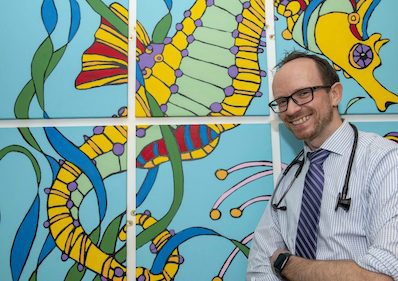New Irish research is investigating whether bacteria in the gut may cause diabetes – potentially unlocking a cure for the chronic disease
Featured on: breakingnews.ie
And in a further step forward, the country’s first national audit of children with the condition is aiming to give youngsters the same standard of care irrespective of where they live.
Around 3,000 children live with Type 1 diabetes here – with a further 300-400 diagnosed every year.
But a leading Cork-based consultant has said the audit, along with major advances in technology, is on course to reduce the burden of the is devastating diagnosis.
“What we are hoping to do over the next couple of years is to arrive at a place in Ireland where we know how many children have Type 1, what their outcomes are and to ensure that every child receives the best standard of care,” said Dr Colin Hawkes of Cork University Hospital.
“Right now, disparities exist across the country and it is not going to be an easy fix, but we are certainly moving in a positive direction to try to identify and address them.”

Cork University Hospital is building a research programme that will be a world leader in this condition.
Ahead of World Diabetes Day on Monday (Nov14), he said further funding is needed to drive research into identifying a cure for Type 1, in which patients’ immune systems attack the pancreas, destroying cells which make insulin – crucial for sending glucose (sugars) to cells for energy.
When not properly managed, it increases the risk of blindness, heart disease and kidney failure in adulthood.
Paediatric endocrinologist Dr Hawkes, who led a major clinical research programme in North America, said his team at CUH is trying to identify microbes in the intestine that might be driving the condition.
“We’re going to keep trying to find a cure for this condition. I would be hopeful but we’re not putting all our eggs in one basket,” he said.
“Microbes make the gut leaky and proteins may be crossing the gut wall and triggering the immune system response.
“We hope to be able to slow the rate of progression, prevent it and develop new treatments.
“We are also partnering with experts across UCC to improve how we treat children with this condition. One example is work that is going to improve how teenagers take over managing this condition from their parents. We have a team including the Business and Applied Social Science Schools helping us with this.”
New investment by the South/South West Hospital Group has meant an extra three diabetes nurses for CUH, while children living with Type 1 now have quicker access to technology such as glucose monitors and insulin pumps.
These remove the need for traditional finger-stick checks, piercing the skin up to 10 times a day to check blood-sugar levels.
A list in CUH of over 120 children awaiting such technology to manage their condition looks set to be cleared by late December.
In terms of finding a cure, Dr Hawkes predicts diabetes research will arrive at one of two places.
“Either technology will be so good that diabetes is more of an inconvenience than a devastating diagnosis. We are moving very quickly in that direction. Or we will find a cure.
“The problem with a cure is that we don’t fully understand what causes Type 1 and we haven’t been able to figure that out for 100 years.”
Funding is needed to build the children’s diabetes research programme at Cork University Hospital – if you can help, donate at cuhcharity.ie.
